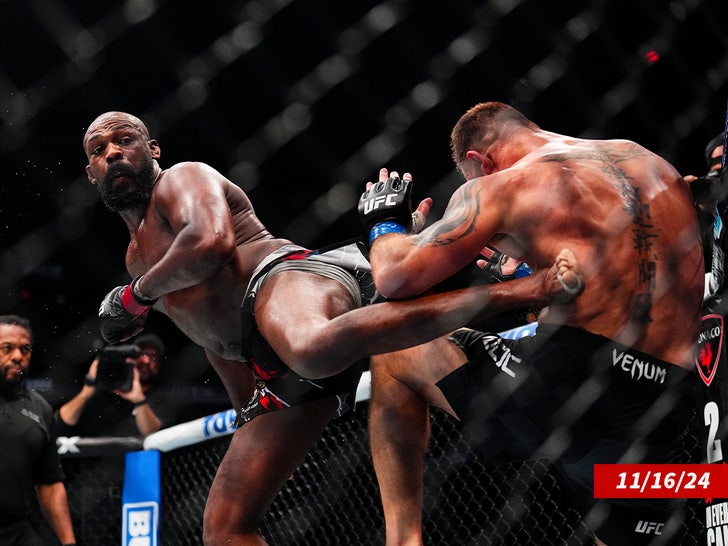
Jon Jones Enters 100 Men Vs. Gorilla Debate, Put Me on Front Line!
Jon Jones on 100 Men vs Gorilla Debate: UFC Champion Would Lead the Frontline Attack
Table of Contents
- Jon Jones Weighs In on the Viral Debate
- The Human Intelligence Advantage
- Jones’ Dream Team Against a Silverback
- Why Jones Would Lead the Frontline Charge
- The Ethical Question: What Did the Gorilla Do?
- Silverback Gorilla vs. Human: Strength Comparison
- How the ‘100 Men vs Gorilla’ Debate Went Viral
- What Other Combat Experts Think About the Debate
UFC Heavyweight Champion Jon Jones believes humans would triumph in the hypothetical ‘100 men vs gorilla’ scenario. (Photo: Getty Images)
Jon Jones Weighs In on the Viral Debate
UFC Heavyweight Champion Jon “Bones” Jones has officially entered the viral internet debate about whether 100 men could defeat a silverback gorilla in combat. When approached by TMZ Sports at Los Angeles International Airport this week, Jones—whose name has been frequently mentioned by social media users discussing the hypothetical scenario—offered his perspective on how such an encounter might unfold.
The 37-year-old fighter, widely considered one of the greatest mixed martial artists of all time, didn’t hesitate to share his thoughts on the theoretical battle that has captured the internet’s imagination. His verdict? With the right team of fighters, the gorilla wouldn’t stand a chance against organized human combatants.
“I want you to think about the intelligence of the human being. We conquered the planet, so the animals on it shouldn’t be a problem to us.”
While Jones acknowledged that he wouldn’t be able to defeat a silverback gorilla in one-on-one combat, he expressed confidence that a coordinated effort from 100 men—particularly if they included elite athletes and fighters—would be successful. The UFC champion’s stance on this peculiar debate has added fuel to an already heated online discussion about human capabilities versus raw animal strength.
The Human Intelligence Advantage
Jones emphasized that the key advantage humans would have in this hypothetical scenario is their superior intelligence and ability to strategize. In his assessment, the collective brainpower and problem-solving abilities of humans would ultimately overcome the physical strength of even the most powerful primate.
This perspective highlights an important aspect of the debate that many participants overlook: humans didn’t become the dominant species on Earth through physical prowess alone. Our ability to plan, coordinate, use tools, and adapt to challenges has allowed humanity to overcome threats from physically superior predators throughout evolutionary history.
Human Advantages in Group Combat
- Strategic Planning: Ability to formulate and execute coordinated attack plans
- Communication: Can verbally coordinate movements and tactics in real-time
- Tool Utilization: Potential to improvise weapons or restraining devices
- Specialized Roles: Different individuals can perform complementary functions
- Adaptability: Can adjust strategy based on the gorilla’s reactions
While a silverback gorilla possesses tremendous strength—estimated to be several times that of the strongest human—Jones suggests that the collective intelligence of 100 men would create a strategic advantage that raw power alone couldn’t overcome. This aligns with historical examples of how human hunting parties have successfully taken down much larger and stronger animals through coordinated efforts.
Jones’ Dream Team Against a Silverback
When asked about who he would want on his team for this hypothetical confrontation, Jones had a clear vision of the ideal squad composition. Rather than selecting random individuals, the UFC champion would opt for a specialized force of elite athletes with specific physical attributes and combat capabilities.
“I think you get a bunch of guys from the NFL roster, bunch of the heavier guys from the UFC roster, and we have that thing down in no time.”
This strategic selection reveals Jones’ tactical thinking. NFL linemen—often weighing over 300 pounds with exceptional strength and athleticism—would provide the raw power necessary to contend with a gorilla’s strength. Meanwhile, UFC heavyweight fighters would contribute combat expertise, grappling skills, and the ability to execute coordinated takedowns and submissions.

Jon Jones demonstrating his striking prowess during his heavyweight title defense against Stipe Miocic at UFC 309. (Photo: UFC/Getty Images)
This combination of size, strength, athleticism, and fighting experience would create a formidable force. Jones believes that such a team would be able to leverage their collective abilities to overcome even the tremendous physical advantages that a silverback gorilla possesses.
Why Jones Would Lead the Frontline Charge
Perhaps the most surprising aspect of Jones’ response was his assertion that, unlike most people who might prefer to be in the last wave of attackers to improve their survival chances, he would volunteer to be on the frontline of this hypothetical battle.
This willingness to lead the charge reflects the championship mentality that has defined Jones’ fighting career. Throughout his UFC tenure, Jones has consistently sought out the toughest challenges and has never shied away from dangerous opponents. This same fearless approach apparently extends to hypothetical interspecies combat as well.
Jon Jones’ Fighting Credentials
- UFC Heavyweight Champion (Current)
- UFC Light Heavyweight Champion (Former, record-setting reign)
- Professional Record: 27-1 (1 NC)
- Notable Victories: Defeats over multiple UFC champions including Daniel Cormier, Alexander Gustafsson, Ciryl Gane, and Stipe Miocic
- Fighting Style: Combines elite wrestling, innovative striking, and exceptional reach
Jones’ confidence in his abilities, even against a creature with vastly superior natural strength, speaks to the self-belief that has made him one of the most dominant champions in UFC history. While he acknowledges the danger, his competitive spirit emerges in his willingness to be at the forefront of such a risky endeavor.
The Ethical Question: What Did the Gorilla Do?
In a surprising philosophical turn to the conversation, Jones raised an ethical dimension to the debate that many participants have overlooked: the moral justification for such a confrontation in the first place.
“But there’s a bigger question on Jones’ mind — what the hell did this gorilla do to deserve a beatdown??” the TMZ reporter noted, capturing Jones’ ethical concerns about the hypothetical scenario.
This question shifts the discussion from the purely physical “could they win?” to the more nuanced “should they fight?” By questioning the gorilla’s hypothetical transgressions, Jones introduces considerations of justice, necessity, and human-animal relations that add depth to what began as a simplistic strength comparison.
Gorilla Conservation Status
While the debate is purely hypothetical, it’s worth noting some facts about real gorillas:
- Gorillas are critically endangered species protected by international law
- There are fewer than 1,000 mountain gorillas remaining in the wild
- Silverback gorillas are typically non-aggressive unless threatened
- Gorillas share approximately 98% of their DNA with humans
- Conservation efforts are crucial for their survival in natural habitats
Jones’ ethical question reminds us that, beyond the physical mechanics of such a theoretical confrontation, there are deeper questions about humanity’s relationship with wildlife and the justification for conflict with other species. This philosophical aside reveals a thoughtful dimension to the fighter’s personality that might surprise those who know him only for his in-octagon prowess.
Silverback Gorilla vs. Human: Strength Comparison
To understand why this debate has captured such widespread attention, it’s important to consider the tremendous physical capabilities of a silverback gorilla compared to even the most elite human athletes like Jon Jones.
| Attribute | Adult Male Silverback Gorilla | Elite Human Athlete | Advantage |
|---|---|---|---|
| Weight | 350-450 pounds (160-200 kg) | 200-300 pounds (90-135 kg) | Gorilla |
| Strength (Pull Force) | 1,500-2,000 pounds (680-900 kg) | 400-500 pounds (180-225 kg) | Gorilla (4-5x stronger) |
| Bite Force | 1,300 PSI | 162 PSI | Gorilla (8x stronger) |
| Skin/Hide | Thick, protective | Relatively thin | Gorilla |
| Intelligence | Problem-solving, but limited | Advanced strategic thinking | Human |
| Coordination | Good for size | Exceptional fine motor skills | Human |
These physical disparities explain why the debate specifies 100 men rather than a smaller number. A silverback gorilla’s raw strength, natural weapons (teeth and claws), and physical durability create a formidable opponent that would require significant numerical advantage and strategic coordination to overcome.
Jones’ acknowledgment that he couldn’t win in one-on-one combat shows a realistic understanding of these physical differences. However, his belief that collective human advantages could overcome these disparities forms the core of his position in the debate.
How the ‘100 Men vs Gorilla’ Debate Went Viral
The “100 men vs. gorilla” debate has become one of the internet’s most persistent hypothetical scenarios, regularly resurfacing across social media platforms including Reddit, Twitter, TikTok, and various online forums. The question taps into fundamental curiosities about human capabilities versus raw animal power.
The debate typically centers around specific parameters: 100 average men (sometimes specified as unarmed) versus a single adult male silverback gorilla in an enclosed space. Variations include different numbers of men, the addition of simple weapons, or changes to the environment.
What makes this particular debate so enduring is how it combines elements of biology, psychology, strategy, and even philosophy. It provokes discussions about human cooperation, the nature of strength, and our place in the animal kingdom. The debate has spawned countless memes, videos, and now, comments from actual combat sports professionals like Jon Jones.
Why Combat Athletes Are Referenced in the Debate
UFC fighters and other combat sports athletes are frequently mentioned in the gorilla debate because:
- They represent the peak of human fighting capability
- They understand combat mechanics, leverage, and strategy
- Many have experience with grappling and takedowns
- They’re accustomed to handling significantly stronger opponents
- Their training involves coordinated team efforts
With Jones now officially weighing in on the scenario, the debate has gained additional fuel from someone who understands physical combat at the highest level. His perspective adds a layer of expert analysis to what had primarily been amateur speculation.
What Other Combat Experts Think About the Debate
Jon Jones isn’t the first combat sports figure to address this hypothetical scenario. Various fighters, trainers, and combat experts have offered their perspectives on the “100 men vs. gorilla” question, often with differing conclusions.
Former UFC champion and commentator Daniel Cormier previously suggested that the number would need to be much higher than 100, emphasizing the gorilla’s overwhelming strength advantage. UFC heavyweight Derrick Lewis famously joked that he “wouldn’t even need 99 other men” to defeat a gorilla—a claim that most biologists and primatologists would strongly dispute.
Combat sports trainer Firas Zahabi, who has coached numerous UFC champions, once discussed the scenario on a podcast, noting that without tools or weapons, humans would be at a severe disadvantage regardless of numbers due to the ineffectiveness of bare-handed strikes against a gorilla’s physiology.
What makes Jones’ contribution to the debate interesting is his emphasis on intelligence and coordinated strategy rather than just physical capabilities. This perspective aligns more closely with anthropological understandings of how early humans successfully hunted larger, stronger animals through collective action and planning.
As this peculiar debate continues to captivate internet discussions, Jones’ willingness to not only participate in the hypothetical scenario but to volunteer for the most dangerous position demonstrates the fearless mentality that has defined his fighting career. Whether facing human opponents in the octagon or theorizing about interspecies combat, Jon “Bones” Jones remains confident in humanity’s ability to overcome even the most intimidating physical challenges through intelligence, strategy, and teamwork.
And as for what the gorilla did to deserve such a confrontation? That philosophical question, raised by Jones himself, might be the most thoughtful contribution to a debate that began as a simple test of physical prowess but has evolved into something far more complex.







